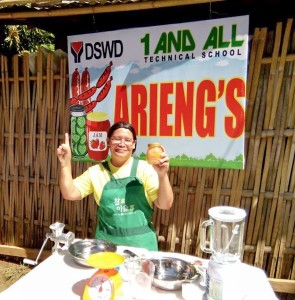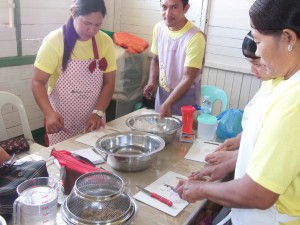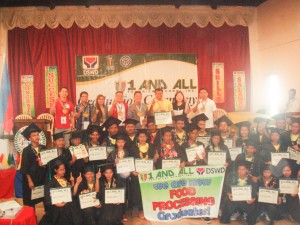
“Sa mga lumipas na panahon, natutunan ko na ang pagtaguyod ng pamilya ay tulad din ng pamamahala ng gobyerno, na nangangailangan ng pagkakaisa at pagtutulungan upang makamit ang tagumpay (over the years, I learned that managing a family is like managing a government, it needs unity and cooperation to succeed), says Maribel Vertudazo, a 47 year old mother of ten children from the Island of Camiguin. She claims to have learn this over her years of experience being a community volunteer to the Department of Social Welfare and Development’s KALAHI-CIDSS program and as a Pantawid grantee.
“Being a community volunteer taught me to be strong and creative in dealing with various types of people”, says Maribel. “While the Pantawid Pamliyang Pilipino Program is providing aide to my children’s need, I also get to improve our family income through the Sustainable Livelihood Program, an all-in privilege indeed”, she adds.
In early days
In early days, Mrs. Maribel’s family was challenged after a near-death encounter of her husband who was once a member of the Civilian Volunteer Organization (CVO) most commonly known as “Barangay Tanod” of Barangay San Jose, Mahinog, Province of Camiguin. Accordingly, her husband was stabbed 5 times in vital parts of his body which he has to undergo vigorous surgery to survive. “Isa ka bulan mi nagpuyo sa ospital tungod sa operasyon sa akong bana, ang iyang tambal kulang ang dos mil kada-adlaw, naglisod gyud ko ato unsaon pagbayad sa mga galastuhon (because of his surgery, we were confined in the hospital for a month, his medicines cost two thousand pesos more or less every day, it was devastating considering we do not have enough money to pay for the expenses, I didn’t know how to survive that)”, she narrates.
But because of her awareness to DSWD programs, she was able to seek for medical assistance and other support to aid their needs. “Nagpasalamat gyud ko sa DSWD kay wala gyud ko gibalibaliran panahon sa among kalisod, (I was thankful to DSWD because they didn’t fail us in times of our struggle”, she affirms.
Moving forward
Although Mr. Virtudazo survived the incident, his vital organs was severely weakened that in result he is prohibited to do heavy lifting jobs or any heavy works for that matter. “Pero ang akong bana gadawat gihapon ug ginagmay nga trabaho sa basakan, pangtustos sa among pagkaon kay inadlaw man iyang abot (but my husband now accepts farm labor works on a daily basis or on call basis were he earns a penny just to support our daily need for food”, Maribel says.
Given the circumstances, Mrs. Maribel has to look for other source of livelihood, she has to earn as well to support her family. Even though most of her children has families of their own, she still have four minor children to attend to.
Three of her children are being monitored under the Pantawid Pamilya program, this means that their education and health needs are supported under this program. “Dagko gyud ang natabang sa Pantawid Pamilya program sa among pamilya kay tungod, tanang panghinaglanon sa akong mga anak sa eskwelahan gitubag na sa programa, dili na kayo ko mamroblema (I am really grateful to the Pantawid Pamilya program because it helped tremendously my children’s needs in school apart from the health benefits, I don’t have to worry too much on this matter)”, she says.
As an added income to her husband, Maribel sells “kakanin” or native Filipino delicacies to their neighborhood.
Community participation leading to development

Moving forward, Maribel continues to be active in DSWD activities, given that she a community volunteer and a Pantawid grantee, she is always informed about the other development programs of the department. When the Sustainable Livelihood Program came in, Maribel knew she has to get involved. Well, she did. She was one of the thirty-four participants from the municipality of Mahinog, who completed the 15-days Food Processing Training provided by 1 and All Technical School for this particular project. “Wala gyud ko nagduha-duha ug apil sa training, labi na kay ganahan ko magluto-luto (I didn’t hesitate to join the training especially because I really like cooking),” she asserts.
For this particular training, the participants were taught on how to process foods, make it presentable and eventually earn from it.

“We are more than privileged to be working hand-in-hand with the government particularly in investing to human capital development, a noble approach to improve their livelihood”, says Ms. Joy Co, the President of 1 and All Technical School.
“Our school’s mission is to develop a workforce of responsible and effective citizen to make significant contribution to the manpower demand locally and globally surpassing the requirements of the industries and the community”, “But beyond this, we also want to genuinely help people like Maribel, who are persistent and resilient, who uses her weakness to rise and succeed”, she adds.
“Human sa among training, gitagaan mi nila ug “starter kits”, galingan, blender, kitchen tools, ug uban pang materials para sa food processing, aron makasugod gyud mi ug negosyo (after our training, the school provided us “starter kits” which included grinder, blender, kitchen tools and other materials needed for food processing necessary for us to start our very own business”, she says.
Maribel further affirms that getting involved in community development programs of the government is really important. “Base sa akong mga na-experience isip usa ka community volunteer ug Pantawid grantee, daghan gyud kog natun-an (based on my experiences as community volunteer and Pantawd grantee, I have learned a lot of things)”, she tells. She confirmed that apart from the technicalities she learned from being a volunteer, she has also evolved as a woman. As a wife and a mother, she now understands the importance of communication and cooperation in sustaining harmonious relationship among families. Most of all, she feels confident about herself.
In her final statement, Maribel emphasized, “kitang tanang pwede mahimong instrumento alang sa kalambuan sa atong nasod (all of should take part in developing our nation, we can be instruments of change)”.
Written by Jamila M. Taha, DSWD


